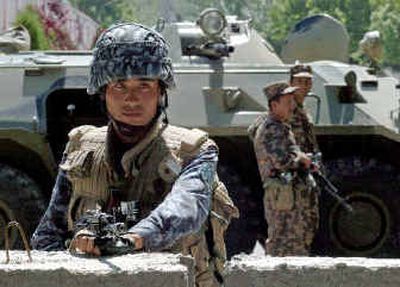U.S. trainees present in Uzbek crackdown

ANDIJAN, Uzbekistan – The masked guard behind the gate at police headquarters projected sheer force, but his eyes brightened as he fondly remembered his time training in the United States.
The U.S. government has trained and equipped Uzbek troops and police – the same forces who opened fire without warning on some 2,000 demonstrators this month in this eastern city. Now international groups are urging Washington to reconsider its aid and involvement.
President Islam Karimov has rejected calls for an independent inquiry into the crackdown. The government claims 173 were killed, including 36 troops. But human rights groups allege that hundreds died when on May 13 Uzbek forces fired on demonstrators who seized government buildings and freed a jail in anger over the prosecution of 23 businessmen for alleged Islamic extremism.
Under U.S. law, no unit of a foreign military can receive training if it is found to have committed a gross violation of human rights.
Uzbek officials won’t name the exact units involved in the Andijan events for security reasons. But one police official said all the country’s elite forces had been mobilized here.
“There were regular army and special forces of all sorts, both Interior Ministry and National Security Service,” the official said on condition of anonymity. “Everyone was there.”
At Andijan police headquarters, the masked guard said he was an intelligence officer with the Kalkon unit, meaning “Shield.” Seeing a foreign reporter, he reminisced about training in the United States, where lessons were first translated into Russian and Uzbek.
Uzbekistan has been a key ally in the war on terror, providing a base for American troops for operations in neighboring Afghanistan. But even before the Sept. 11, 2001, attacks, the U.S. government provided training and equipment to Uzbek troops and police.
Under a 2002 strategic partnership agreement between Washington and Tashkent, the United States pledged to help equip Uzbek military units and train them in combating terrorism, drug trafficking, money laundering and other threats.
U.S. and Uzbek soldiers have held regular training exercises since the 1990s, with American special forces troops heading to the mountains with their Uzbek counterparts for lessons on repelling incursions – a main worry for Uzbekistan after several such attacks starting in the late 1990s by the al Qaeda-allied Islamic Movement of Uzbekistan.